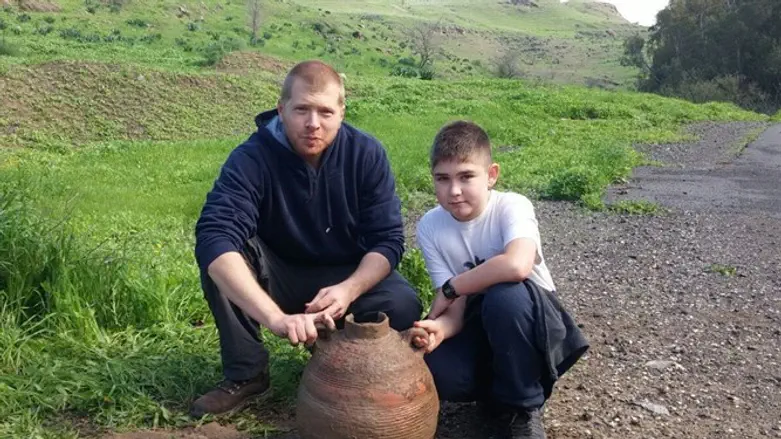
Two Israeli families hiking near the Harod Stream in Beit She'an's National Park in northern Israel discovered a Byzantine-era pitcher.
"We were hiking, and at one point stopped to rest on the slope," Tamar Armon, one of the mothers, said. "Suddenly we spotted an 'ear' - a clay handle sticking out of the ground. We were really surprised and excited to discover a complete jug, heavy and beautiful. As people who like archaeology, we read all the signs along the path, and one of them said that clay jugs had been found at that spot. And here, we ourselves found one of them, and it's about 1,500 years old."
The Avidor and Armon families transferred the jug to the Israeli government, and received in return a certificate of appreciation from the Israel Antiquities Authority (IAA).
Nir Distlfeld, a supervisor for the northern branch of IAA's Robbery Prevention Unit, said, "We congratulate the families on their awareness and good citizenship. The strong rains falling near Beit She'an exposed soil at the site, which is known to be filled with antiquities. It is natural that such findings are suddenly found near the surface, sending us regards from the past."
"It is very important to report any and all findings to the Israel Antiquities Authority immediately upon discovering them, and to leave them where they were found so that archaeologists can extract as much historical information as possible from the site."
The IAA's Dr. Walid Atrash added that "the hikers found a Byzantine jug, which was preserved in its entirety. The jug is from the sixth or seventh century of the Common Era. These types of jugs served to store wheat and legumes such as beans and chickpeas. Not far from here, there is a magnificent church and an ancient cemetery, and it makes sense that the jug was placed on one of the graves as part of a ritual, and was swept towards this area over time."